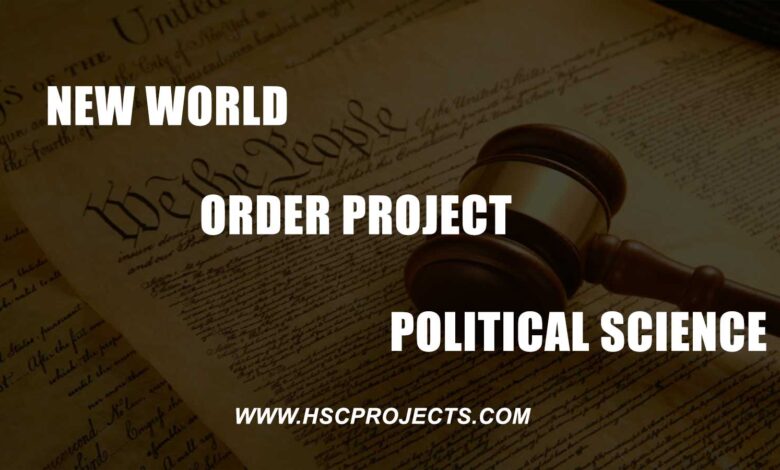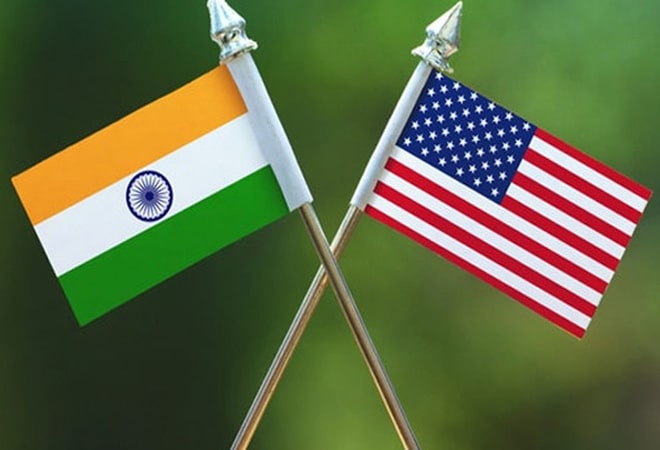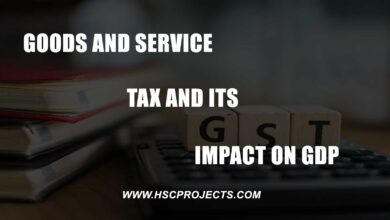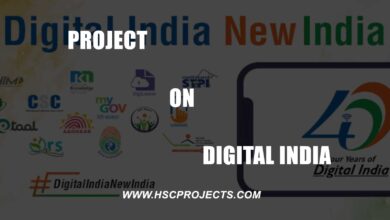
The New World Order – Political Science Project
OVERVIEW
We have seen that the end of the cold war left us without ant serious rival in the world the era since then has been described as a period of our dominance or an unpopular world. In this chapter, we try to understand the maturity, extent, and limits of this dominance. We begin by narrating the story of the rise of the new world war order from the first gulf war to the us-led invasion of Iraq. We then pause to understand the nature of our dominations with the help of the concept of ‘hegemony’ after exploring the political-economic and cultural aspects of our hegemony.
AYESHA
Ayesha was doing very well in her studies at a high school on the outskirts of Baghdad and was planning to study medicine at university. She lost a leg in 2008 when a missile slammed into an air-raid shelter in which she was hiding with her friends. She is learning to walk all over again she still plans to become a doctor, but only after the foreign armies leave her country.
JABU
Jabu is a talented young star who lives in Durban. In South Africa, his paintings are heavily influenced by traditional tribal art forms. He wants to go to art school and later open his studio. However, his father wants him to study for an MBA and then join the family business. The business is not doing well: Jabu’s father feels that with an MBA degree, Jabu will be able to make the family business profitable.
ANDREI
Is a young man living in Perth in Australia. His parents are immigrants from Russia his mother gets very angry every time Andrei puts on blue jeans to go to church. She wants him to look respectable in church. Andrei tells his mother that jeans are “cool” and that they give him a sense of freedom. Andrei’s father reminds his mother how they two used to wear jeans when they were youngsters in Leningrad, and for the same reason that their son invokes. Andrei has had an argument with his mother Jabu may be forced to study a subject that he has no interest in contract Ayesha has lost her leg and is lucky to be alive. How can we even discuss their problems in the same breath? We can and we must do so as we share his chapter all these have been in different ways affected by our hegemony we will meet Ayesha Jabu and Andrei again but let us first understand how our hegemony began and how it operates in the world today. We will follow the popular usage of the word ‘America’. But it may be useful to remind ourselves that the expression America events the two continents of north and south America and that us is only one of the countries of the American continent. Thus, the use of the word America solely for us is already a sign of our hegemony that we seek to understand in this chapter.
BEGINNING OF THE NEW WORLD ORDER

- The sudden collapse of the soviet union took everyone by surprise. While one of the two superpowers closed to exist the other remained with all its power intact, enhanced. Thus, it would appear that our hegemony began in 1991 after soviet power disappeared from the international scene.
- This is largely correct but we need to keep in mind to riders to this first as we shall see in this chapter some aspects of our hegemony did not emerge in 1991 but go back to the end of the second world war in 1945.
- Second, we did not start behaving the way an economic power right from 1991: it began clear that the world was living in a period of hegemony.
- In August 1990, Iraq invaded Kuwait, rapidly occupying and subsequently annexing it After a series of diplomatic attempts failure of coming acing Iraq to quit its aggression the United Nations mandated the liberation of Kuwait by force.
- For the UN, this was a dramatic decision after years of deadlock during the cold war us president George H.W world Bush hailed the emergency of a new ‘World Order’.
- A massive coalition force of 660,000 troops from 34 countries fought against Iraq and defeated it in what came to be known as the first Gulf War, Desert storm’ was overwhelmingly American An American General.
- The first Gulf war revealed the worst technological gap that had opened up between us the military capability and that of other states the high publications use of so-called e smart banks by the us-led served observers to call thus a computer war’ widespread television courage also made it a watching the destruction of Iraqi force on TV in the confront of their living rooms.
- Incredibly we may have made a profit from the war according to many reports we received more money reports. We received our money from countries like Germany, Japan, and Saudi Arabia that it had spent on the war.
THE CLINTON YEARS

- Despite winning the first war, large H.W. bush lost the US presidential actions of 1992 to William Jefferson while Clinton of the democratic party won’t campaign on domestic rather than foreign policy issues. Bill client won again in 1996 and thus remained president of us for right years.
- During the Clinton year, it often seemed that we has withdrawn into its internal affair and was not fully managed in world politics foreign policy the Clinton government tended to focus on soft issues like democracy promotion climate change, and world trade rather than on the chord politics of military power and security.
- Another significant use of military action during the Clinton years was in response to be the bombing of us embossers in Nairobi, Kenya, and Dar-us-salaam Tanzania in 1998 their bombings were attributed to M-Qaida, a terrorist organization strongly influenced by extremist increment ideas within a few days of this bombings president Clinton ordered operation infinite reach a series of cruise missile strikes on al-Qaida terrorist target in Sudan and Afghanistan the US did not bother about the UN international law in this law civilian facilities unconnected to terrorism in introspecting this was immensely the beginning.
9/11 AND THE ‘GLOBAL WAR ON TERROR’

- On 11 September 2001, mine tern hijackers having from several Arab countries took control of four American commercial aircraft shortly after took off and flew them into an important building in the north A third aircraft crashed into the Pentagon building in Arlington Virginia where the US defense department is headquartered the four aircraft, presumably bound for the capital building of the US congress came shown in the field in pencyiamia. The attack has come to be known as 9/11.
- Us forces macle arrest all our the world after without the knowledge of the government of the persons being arrested transported this person across countries as obtained them in secret prisons.
- Some of them were brought to Guantanamo Bay a US Naval base in Cuba where the prisoners did not enjoy the protection of international law of the law of their own country or that of the US Even the UN representatives were not allowed to meet their prisoners.
THE IRAQ INVASION
- On 19 March 2003, the US launched its invasion of Iraq under the codename ‘ operation Iraq freedom’ more than forty other countries joined the US-led coalition of the willing after the US refused to gain its mandate for the invasion. The tensible purpose of the invasion was to prevent Iraq from developing weapons.
- It is speculated that the invasion was motivated by other objectives such as controlling Iraqi oil fields and insulating a regime friendly to the US.
- Although the government of Saddam Hussein full scarify the US has not been able to ‘pacify’ Iraq instead a full-fledged insurgency against our occupation was ignited in Iraq.
- While the US has lost over 3,000 military personnel in war, Iraqi consultees are very much higher.
- It is conservatively estimated that 30,000 Iraqi civilians have been killed since the US-led invasion.
- It is now widely recognized that the US invasion of the Iraq war saw crucial respect since military and political failure
MEANING OF HEGEMONY

- Politics is about power just as individuals want to gain and retain power. We routinely talk of someone doing incoming powerful or someone doing something for power in the case of world politics too countries and groups of countries are engaged constantly buying to gain and retain power.
- This power is in the form of military domination economic power political don’t and cultural superiority.
- Therefore if we wanted to understand world politics we must understand the distribution of power among the countries of the world.
- For instance, during the year of the cold war (1945-46) power was divided between the two groups of power, and we and soviet Clinton represents two ‘camps’ or centers of power in international politics during that period.
- It may be more appropriate to describe an international system with only one center of power by the term ‘hegemony’.
HEGEMONY AS HARD POWER
- The roots of the word hegemony in classical Greek. The word implies the leadership or predominance of one state was originally used to demote the preponderant position of Athens vis-à-vis the other city-state of ancient Greece thus, the first meaning of hegemony relates to the relationship patterns and balance of military capability between states it is the notice of hegemony as military preponderance that is especially germane to the current position and rote of the US in the world politics.
- Undoubtedly the US invasion of Iraq reveals several Americans’ vulnerabilities the US invasion of Iraq people into submitting to the occupation force of the US-led coalition.
- To fully understand the nature of American weakness, however, we need to have a historical perspective Imperial powers through history have used military forces to accomplish only four tasks conquer deter punish, and police.
- As the Iraq invasion shows the American capacity to conquer is formidable similarly the US capability to ask and punish is self-evident whereas us military capability has thus been shown to see serious weakness is in policing on occupied territory.
HARMONY AS STRUCTURAL POWER
- The second nation of hegemony is very different from the first. It emerges from a particular understanding of the world economy. The basic idea is that an open economy requires a hegemony or dominant power to support its creation and existence.
- The hegemon usually does this to its advantage but often to its relative determinant as its competitors take advantage of the openers of the world economy without paying the cost of maintaining its openers.
- An example of a global public good is the internet although it is seen today as making the virtual world of the world wide web possible.
- We should not target that the internet is the direct outcome of our military research project that began in 1950. Even today the internet realize a global network of satellites most of which are around by the US government
- As we know us is present in all parts of the world, in all sectors of the world economy, and in all the areas of technology
- The US share of the world economy remains enormous of percent.
- The US also accounts for almost 14% of the world trade.
- A simple example of the structural power of the US is the academic degree called the master’s in British Advertisement (MBA) the idea is that business is a performance that depends upon skills that can be taught in a university and are consequently American.
- The first business school in the world the Watson school at the University of Pennsylvania was established in 1881 the first MBA course where around 1900 the first MBA courses outside us as established only in 1950 today here in the country in this world MBA is not a prostyle academic degree this takes us back to out south Africa Jabu this explains why Jabu’s father is rusting that the son MBA instead.
HEGEMONY AS SOFT POWER
- It would however be a mistake to say we hegemony purely on military and economic terms without considering. The ideological or the cultural dimension of US hegemony in this third scene of hegemony is about the capacity to ‘manufacture content here hegemony implies and particularly ideological spheres hegemony arises when the dominant class in the country can win the consent of dominated classes by persuading the domination class.
- Adapted to the field of world politics this nation of hegemony suggests that a dominant power deploys not only military power but also ideological resources to shape the behavior of the completing and lesser power.
- The behavior of the weaker countries is influenced in ways that favor the interest of the most powerful countries, in particular, its desire to remain permanent content in other words goes hand-in-hand with and is often more effective than Harrison.
- The predominance of the US in the world today is based not only on its military power and economic powers but also on its cultural presence whether we choose to recognize the fact or not all ideas of the dreams of individuals and societies across the globe are dreams out by practices prevailing in 20th century America. America is the most reductive and in the sense the mart powerful culture on earth.
- This attribute is to persuade rather than coerce. The time we get so used to hegemony that we hardly notice it anymore that’s we hardly it river birds and free around us.
- During the cold war, the US found it difficult to score unicorns against the soviet union in the realm of hard it was in the area of structural power and soft power that we scored portable unites.
- Although the soviet centrally-planned economy provided an alternate model o internal economic organization the world economy throughout the cold war years remained a world capitalist economy.
- But it was in the area of soft power that us was ultimately triumphant. The example of blue jeans in the soviet union clearly shows us that was able to engineer a generational divide in soviet society on basis of cultural products.
CONSTRAINTS ON AMERICAN POWER
- History fills us that empires decline because they decay from within similarly the biggest constraints to America’s hegemony lie within the heart of hegemony itself we can identify three constraints on American power. Now their constraints seemed to operate in the years following 9/11
- However, it now appears that all three of these constraints are slowly beginning to operate again
- The first constraint is the institutional architecture of the American state itself a system of division of powers between the three brands of government places significant brakes upon the unrestrained and immoderate excise of American military power by the executive branch
- The second constraint on American power is also dramatic and stems from the open nature of American society Although the American mass media may from time to time impose or promote a perspective on domestic public opinion in the US.
- This factor in the long run is a huge constraint on US military action overseas.
- However, it is the third constraint on the US that is perhaps the most important there is only one organization in the international system that could moderate the exercise of American power today and that is the north Atlantic thereby Organization (NATO) and its allies in the NATO will be able to moderate the exercise of US hegemony
INDIA’S RELATIONSHIP WITH THE US

During the cold war years, India found itself on the opposite side of the divide from the US India’s closest friend during those years was the soviet union after the collapse of the soviet union India suddenly found itself priceless in an increasingly hostile international environment.
- We mustn’t do the core sight of the fact two new factors have emerged in India-US relations in recent years Indeed these two factors are interrelated inside the following factors :
- The US absorbs about 65 percent of India’s total exports in the software sector.
- 35 percent of the technical staff of being is estimated to be of Indian origin.
- 300,000 Indians work in silicon valley.
- 15 percent of all high-tech start-ups are by Indian Americans.
- Like all other countries, India too has to decide exactly what type of relationship it wants with the US in the phase of global hegemony. The choices are not exactly easy within India the debate seems to be around three possible strategies.
- That Indian analysis who all international policies largely in terms of military power are fearful of the growing closeness between India and the US. There would prefer that Washington focuses on increasing its comprehensive national power.
- Other analyses see the growing convergence of interest between the US and India as a historic opportunity for India as they advocate a strategy that would allow India to take advantage of US hegemony and the mental convergences to establish the best possible opportunity for itself opposing the way they argue is fates strategy that all only hurt India in a long run.
- The third group of analysis would advocate that India should take lead in establishing a coalition of could become more powerful and may succeed in wearing the hegemony away from its dominating ways. India needs to develop an appropriate mix of foreign policy strategies to deal with the US.
HOW CAN HEGEMONY BE OVERCOME?
- How long will hegemony last? how do we get beyond hegemony there become for obvious reasons some of the burning questions of our time history provide us with some fascinating dues to answer these questions but what about the present and future ? in international politics very few formally factors curtain the exercise of military power by any country.
- There is no world government like the government of the country. As we shall see in chapter 6, international organization is not world government thus, international politics is, “politics “ without government. There are some rules and norms called that do not prohibit war but few states will entrust their security to international law alone. Does this mean that there is no escape from war and hegemony?
- In the short term, we must recognize that no single power is anywhere rear balancing the US military & military coalition against us is even less likely given the differences that exist among big countries like China, India, and Russia that have the potential to challenge the hegemony.
- Some people believe that the resistance to American hegemony may not come from other states which as we have seen are powerless to confront the US today, but rather from non-state actors.
- These challenges to American hegemony will emerge in the economic and cultural realms and will come from the combinations of non-governmental organizations (NGO) social and public opinions it may arrive from sections of media and intellectual artists and winters.
- These various actors may well from units across national boundaries including Americans, to criticize and results in US policies.
- You might have heard the saying that we now line in a ‘global village’ in this global village we are all neighbor of the village headman if the behavior of the headman become mitoler tube we will not have the opinion of leaving the global village.
ACKNOWLEDGEMENT
I would like to convey my heart-filled thanks to my teacher who guided me throughout the project and gave me valuable suggestions for the completion of the project. This project has been submitted according to the guidance.
CERTIFICATE
This is to certify that have completed the project under my supervision. He has taken proper care and shown almost sincerity in the completion of this project. I certify that this project is up to my expectations and as per the guidelines issued.
Teacher’s Signature
Examiner’s Signature
BIBLIOGRAPHY INTERNET
En.m.wikipedia.org
www.socialstudies.org
worldview.startfor.com
http://www.onlinesciencepublishing.com
BOOKS
DOWNLOAD PDF OF THE PROJECT

Password: hscprojects.com
In order to download the PDF, You must follow on Youtube. Once done, Click on Submit
Follow On YoutubeSubscribed? Click on Confirm
Download The New World Order – Political Science Project PDF






